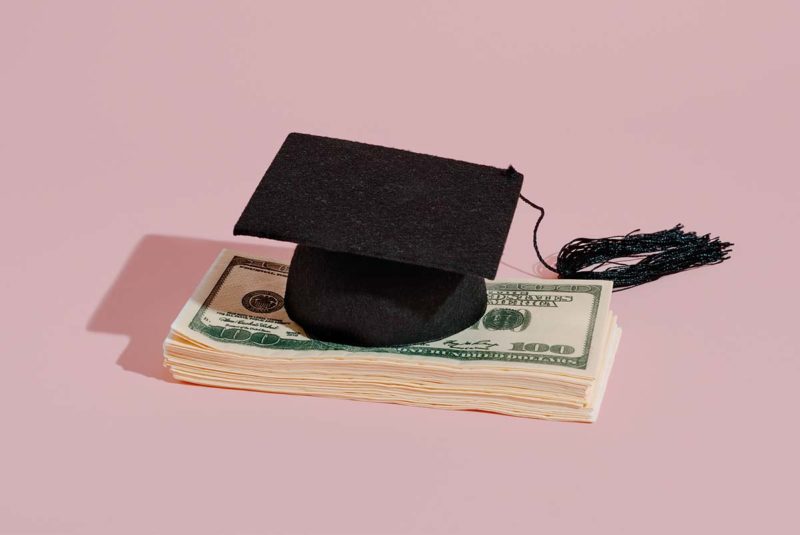Show of hands if you’ve heard this before: “Your college years are the best years of your life!” Looking back at that time – and looking ahead to life in “the real world” – you might wax nostalgic, especially when those student loan payment notifications kick in.
Student loan debt can create a serious sense of financial insecurity, but this MoneyTips guide to paying off student loans will help take some of that stress away, offering insights into paying off student loans and helping you figure out a solid repayment strategy.
Let’s take a look at some of the steps you can take to get started.
Know What You Owe
A great way to reduce some of the stress associated with paying off student debt is to get a solid grasp on what you owe. Repayment plans and lender agreements can be complicated, and many student loan borrowers are more than happy to simply pay their monthly minimums without taking a closer look at how their debt is structured.
When you understand how your debt is structured, you’ll get a clear mental picture of the amount you owe and be better equipped to reduce your debt faster.
In addition to the loan amount, you need to know:
- Which lenders or student loan servicers you owe money to
- Whether the loan is private or federal
- The interest rate on each balance
- Your minimum monthly payment
Armed with this info, you’ll know what you owe and how payments will impact your budget.
Student Loan Repayment Program Options
Student loans can be a heavy financial burden, but not one you must carry on your own. Depending on the type of financing you used, there are plenty of repayment options to help you pay off your student loans fast.
Student loan consolidation
Student loan consolidation combines multiple loans into one loan, and one lender collects your monthly payments. For borrowers with multiple payment plans at different interest rates, student loan consolidation offers an easy way to simplify the repayment process.
How you consolidate your debt will depend on whether you have federal or private student loans.
Federal student loan consolidation
The Department of Education (DOE) issues federal student loans. And when you want to consolidate your federal student loans, you do it with the DOE. If your consolidation is approved, the outstanding balances on your student loans get bundled into one loan, and you make one loan payment every month.
Consolidating federal loans is free and has no credit requirement. Consolidation won’t reduce the interest rate on your debt, but you’ll get a new repayment plan, potentially reducing your monthly payment by extending the loan term.
Private student loan consolidation
Private student loan consolidation (aka private student loan refinancing) has stricter approval guidelines. Unlike federal loan consolidation, you work with private lenders who will check your finances, including your credit report, employment history, income and debt to set the loan’s terms. With good credit, you’ll have a better shot at scoring a lower interest rate.
If you meet the lender’s requirements, they will pay off your outstanding student loan debts with a new loan, and you’ll make one monthly payment to the lender to pay off the loan.
While the DOE only consolidates federal loans, private lenders allow borrowers to consolidate (or refinance) federal and private loans. Keep in mind that you risk losing some of the protections the DOE provides, such as income-driven repayment plans or student loan forgiveness, if you consolidate your federal and private loans with a private lender.
Student loan forgiveness programs
Student loan forgiveness frees borrowers from the obligation of repaying some or all of their federal loans. Here’s a look at some student loan forgiveness programs, their eligibility requirements and what benefits they provide:
Perkins loan cancellation
Perkins loans – which were offered to students who demonstrated financial need – can be fully or partially canceled, depending on a borrower’s employment history or volunteer service. If you work in public service as a full-time nurse, teacher or law enforcement official, you may qualify for complete Perkins loan forgiveness after a certain number of years.
Income-driven repayment plans
If you’re struggling to keep up with your monthly student loan payments, income-driven repayment (or IDR) might be a good option. With an IDR plan, your monthly payment is restructured based on the amount you make and the size of your family, helping ensure your repayment plan is affordable.
Public Service Loan Forgiveness
Much like Perkins loan cancellation, Public Service Loan Forgiveness (PSLF) is only available to borrowers who work in certain fields. As a full-time employee of a government agency or nonprofit, you may qualify for PSLF if you’ve made 120 monthly installments on your student loan.[1]
Teacher Loan Forgiveness
As the name suggests, the Teacher Loan Forgiveness program provides educators with student loan relief. If you teach lower-income students, after 5 consecutive years of working full time, you can qualify for up to $17,500 in forgiveness. How much forgiveness you receive will depend on the subject you teach.[2]
Avoid student loan repayment scams
So many borrowers are carrying a lot of student loan debt, and unfortunately, this has created an opportunity for bad actors to make a quick buck. Student loan repayment scams take advantage of borrowers’ desperation to get rid of their student loans.
When you’re applying for federal student loan forgiveness, please confirm that you’re working with an actual DOE representative.
If you’re working with private lenders, steer clear of programs with aggressive advertising copy, like “act now” or “first come, first served.”
What Is Student Loan Forbearance?
Typically, student loan forbearance (aka student loan suspension) temporarily suspends your student loan payments for about a year.
Even though your payments are suspended, interest will continue to accrue on your loan balance. But there are exceptions to the rule – like when the loan is suspended by the Department of Education, or you apply for a loan deferment.
If you’re struggling financially, you can request a forbearance from your lender. While you can renew forbearance for federal student loans, private student loans don’t have the same flexibility. If your loan is with a private lender, you’ll likely only qualify for forbearance once.
Forbearance approval is usually decided by the lender and typically applies to borrowers who are struggling for any number of reasons, including a layoff, high medical bills or a salary decrease.
Tips To Pay Off Student Loans Faster
You may be staring at a mountain of student loan debt to pay back, but that doesn’t mean the process needs to be complicated. With the right plan and maybe some changes in your spending habits, you’ll be better equipped to pay off your student loans faster than anticipated.
Here’s a look at some helpful strategies to streamline the process of paying off your student loans:
Set up automated payments
It can be challenging to keep track of different due dates and payment amounts. Any disorganization can lead to late or missed payments that can damage your credit score and make it harder to make financial moves in the future.
Setting up autopay will keep this from happening. You can rest assured your bills will be paid on time, and you’ll never have to worry about late fees.
Putting ‘found money’ toward the principal balance
“Found money” is extra cash you have on hand that wasn’t accounted for in your monthly budget. It can be anything from an inheritance, a tax refund or gifts to hitting the lottery.
If you use that extra cash to pay down the loan’s principal (aka the total amount you borrowed minus interest) it can be a great way to reduce your balance or catch up when you’re behind, without needing to readjust your monthly budget.
Use the student loan grace period
Good news! After graduating, you’ll get some breathing room to figure out the whole adulting thing and how your student loans will fit into your new life and your budget. It’s what’s commonly known as the grace period.
Grace periods typically last up to a year after you graduate. Interest may be added to your student loan balance during the grace period, but you don’t need to make monthly payments during this time. However, if you have some extra money, it doesn’t hurt to start making payments right out the gate!
How Long Does It Usually Take To Pay Off Student Loans?
Generally speaking, it usually takes between 10 and 30 years to pay off student loans. How long it takes will depend a lot on the type of loan you take out.[3]
If you have federal student loans, for example, you might be enrolled in a standard repayment plan that requires you to make fixed monthly payments for 10 years. If you can’t repay the loan in 10 years, other repayment plans can extend the loan’s term.
The repayment term for private student loans depends on the lender you’re working with, but usually falls between 5 and 20 years.
If you enroll in forbearance or consolidate your student loan debt, the length of your loan repayment can change drastically.
Is It a Good Idea To Pay Off Student Loans Early?
If you have extra cash on hand, paying off your student loans early might sound like a savvy way to spend your money. But you should consider a few factors before draining your savings to pay off your debt.
Here’s a look at the pros and cons of paying off student loans early:
PROS of Paying Off Student Loans Early👍
The faster you pay off your loan, the less time there is for interest to accrue. When you settle your loans ahead of schedule, your degree is suddenly cheaper because you’ve drastically reduced the amount you’d pay in interest over the life of the loan.
Without student loans weighing down your monthly budget, you’ll have more money to save or spend elsewhere.
With less debt and a history of responsible spending attached to your name, you’ll have more (and better) opportunities for financing down the line. Lenders will be more inclined to approve you for loans or lines of credit with a lower debt-to-income (DTI) ratio.
CONS of Paying Off Student Loans Early👎
If you pay extra each month, you’ll have less money to spend on other things. Before you set out to pay your student loan debt ASAP, make sure you have room in your budget to account for the decrease in your spending power.
The interest you pay on your student loans is tax deductible. If you pay off your loans early, you won’t be entitled to this deduction, and your annual tax bill will be higher than it was before.
Student Loans: A Necessary Evil?
You might spend those first postgraduate years wondering if your student loans were worth it. Hopefully, life will offer the opportunity to recognize how beneficial they were in the long run.
In the meantime, there are programs (if you have federal loans) and debt payoff strategies for any loan type that can make paying off your student loans a short-term affair. It all depends on finding the solution and payment plan that works best for you.
The Short Version
- A great way to reduce some of the stress associated with paying off student debt is to get a solid grasp on what you owe
- Depending on the type of financing you used, there are plenty of repayment options to help you pay off your student loans fast
- For borrowers with multiple payment plans at different interest rates, student loan consolidation offers an easy way to simplify the repayment process
Federal Student Aid. “Public Service Loan Forgiveness (PSLF).” Retrieved October 2022 from https://studentaid.gov/manage-loans/forgiveness-cancellation/public-service
Federal Student Aid. “Teacher Loan Forgiveness.” Retrieved October 2022 from https://studentaid.gov/manage-loans/forgiveness-cancellation/teacher
Education Data Initiative “Average Time to Repay Student Loans.” Retrieved October 2022 from https://educationdata.org/average-time-to-repay-student-loans




